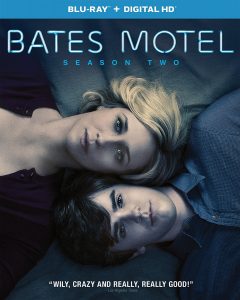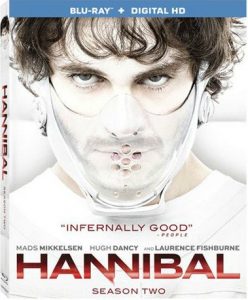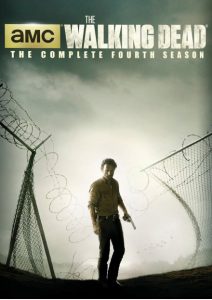I have a friend, Shaune, who’s a big horror movie fan, but he has found the current character stuff on “The Walking Dead” rather boring. This is understandable: Television has never been able to be as flat-out scary as movies. There’s something about a dark theater, big screen and big sound. Plus, weirdly, the fact that characters are more secondary (and disposable) in movies than on TV helps the scare factor. When watching an “X-Files” monster-of-the-week, for example, you don’t have to worry that Mulder or Scully will be killed off. When watching a horror movie, everyone’s expendable.
That having been said, horror TV shows can work very well – but for different reasons. “Hannibal”(Fridays on NBC), “The Walking Dead” (Sundays on AMC) and “Bates Motel” (Mondays on A&E) make a delicious 1-2-3 punch for “horror TV” fans – or, to put in more accurately, fans of down-and-dirty character shows. These programs won’t make you jump off your couch or give you nightmares, but they do fascinatingly probe the dim recesses of the human psyche. Another connection is that all three are based on other source material – books (“Hannibal” and “Bates Motel”) and comic books (“The Walking Dead”). While the “Hannibal” and “Bates” franchises became movies, it’s relevant to note that they didn’t originate there.
All three of these shows set up not-quite-normal worlds that are perfect for exploring the darker sides of human nature. Most notable is “The Walking Dead,” set in an anarchic zombie apocalypse. The story of Lizzie – who doesn’t grasp the value of human life or the difference between being alive and dead — would be one of those tragic “no easy answers” stories in the real world. We’d lock her away in an asylum and tell ourselves she’s being treated humanely, at least. And it’d be the right decision, because, as Carol observes, “She can’t be around other people.” In a zombie apocalypse, where there are no asylums, the only solution is to shoot her in the back of the head “Of Mice and Men”-style. I think that’s why we saw a bunch of weeping guests on “Talking Dead” – it wasn’t just the tragedy of Mika’s and Lizzie’s deaths, it was the knowledge that executing Lizzie was the right and moral thing for Carol to do.

The world of “Bates Motel” is the exact opposite of “Dead’s” – it’s not the lack of institutions, but rather institutions themselves that cause chaos for Norma Bates as she attempts to run a motel in a small Oregon town. Most prominently, Norma bought a motel on a highway that is soon going to be bypassed, so she seems destined to take a fiscal bath. But also, Oregon’s (and the federal government’s) war on marijuana leads to the violence that serves as the backdrop of White Pine Bay, which is thriving thanks to the delicate “look the other way” balance overseen by the sheriff. Norman’s high school crush Bradley kills the drug kingpin who killed her dad, then Norman and brother Dylan (who works for the pot growers) help her flee town. But I think it’s safe to say that Bradley, Norman, Dylan and Norma are far from done with their “drug problem.”

(I wonder if the producers breathed a huge sigh of relief last year that they didn’t set their show in Washington state, which legalized and regulated marijuana after “Bates Motel” started production. If Oregon were to follow suit, the show would have little choice but to work that into the plotline – which, truth be told, could be quite fascinating.)
Additionally, Norman is mentally unstable. (He’d have suffered Lizzie’s fate by now if he lived in a zombie apocalypse.) We viewers know he killed his father and his teacher during “blackouts,” where he can’t remember what he did after the fact. While the abusive Mr. Bates had it coming, Miss Watson didn’t, so “Bates Motel” is now walking a delicate line where its main character is a hormonally imbalanced murderer. He is quite sympathetic, though, thanks largely to the performance of Freddie Highmore.

“Hannibal” does “Bates Motel” one better: Its title character kills and eats people, and blames it on his “friend” Will (who is wrongly on trial for murder this season) – and unlike Norman or Lizzie, Hannibal is well aware of everything he’s doing. Deliciously played by Mads Mikkelsen, Hannibal is a villain we love to hate (and hate to love). I’m rooting for Will and against Hannibal. Yet there’s no denying that it’s compelling to see how far Hannibal can insinuate himself into law enforcement (he’s taken over Will’s position as an FBI crime consultant) while spending his free time killing, preparing and eating people – and also serving them to his FBI colleagues with artistic flair in his dining room.
While “Dead” and “Bates” have character arcs and plot lines, “Hannibal” tiptoes the fine line of style. Last season, we’d see Hannibal serving a delicious-looking meal and wonder if it was human rather than beef or pork. Now, we actually see him cutting up a human calf with a bandsaw, then proceeding to prepare leg-of-human for himself. Because he always adds in delicious vegetables and a carefully selected wine, a viewer can’t deny that Hannibal is – as my friend Seth says — a baller in the kitchen. He is also efficient, with the way he packs and freezes the rest of the leg for future meals. With all of its culinary scenes, “Hannibal” often makes me hungry while watching it; it’s a great show to watch over a box of Sour Patch Kids and a bowl of popcorn.
Executive producer Bryan Fuller is a proven genius – see “Dead Like Me” and “Wonderfalls” – but, my, what a delicate path “Hannibal” walks. There’s hardly any plot to it – in fact, the season’s opening prologue showed us that Hannibal will kill Laurence Fishburne’s Jack Crawford later in the narrative — and it’s always in danger of going from the most disturbing show on TV to the most silly. It also faces the “Prison Break” problem: Once the prisoners escaped, the show would be over; because the show was popular, the escape plot was padded out, and it became a worse show. “Hannibal” seems like it would do well to have Hannibal be found out (currently, at least four characters are highly suspicious of Hannibal), and Will cleared of all charges, at the end of this season. But that also means the show will be over.
“Bates Motel” and especially “The Walking Dead” have kept their narratives fresh even though they are also shows with end goals. In “Bates,” it’s getting Norman to the point he’s at in “Psycho”; in “The Walking Dead,” it’s finding a cure to the outbreak. I think the goal should always be good TV, even if means a popular show like “Hannibal” comes to a natural end. I would recommend that NBC immediately signs Fuller to launch another show, then hypes it up as the next project from the man behind “Hannibal.” Indeed, FX’s “American Horror Story” uses the format of keeping the same crew (and even some of the same cast) but making a new show every year. Interestingly, the first and second seasons of “AHS” (I haven’t tuned in since) floundered, in my opinion, because it put an emphasis on weirdness and scares over characters.
“The Walking Dead,” “Bates Motel” and “Hannibal” are all character-driven shows, and that’s the best way for horror to work on TV.

